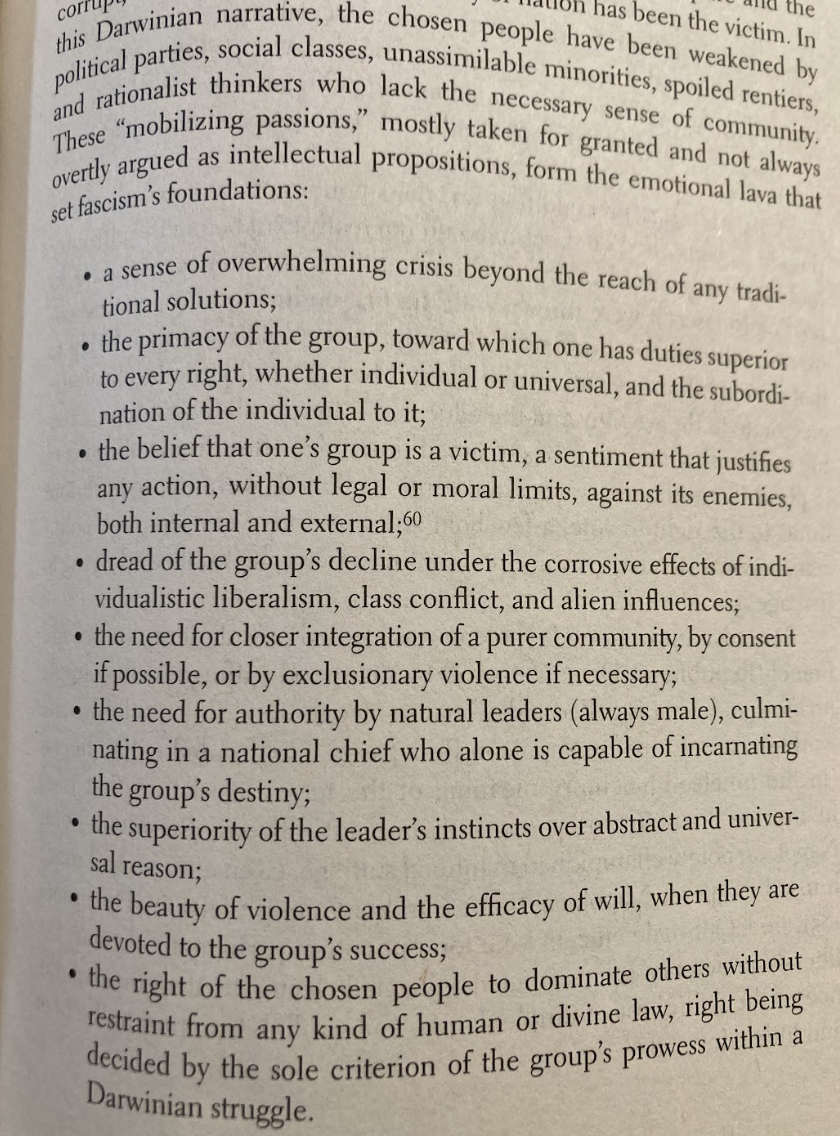Fascism: An Expression of Gut-Wrenching Fear

I’m halfway through Robert O. Paxton’s The Anatomy of Fascism and I take no pleasure in reporting the United States is checking a lot of fascist boxes.
Too many. Way too many.
Sometimes I find myself squirming in my seat as I read the timely tome, hoping – praying – some condition of other fascist movements will present itself that I find altogether foreign. With each passing page, I hope Paxton presents me with an historical example that in no way resonates with me, a 21st century American watching what could be the final days of constitutional governance in our advanced democracy.
Sign up today and support Bad Faith Times!
But no. Every chapter of The Anatomy of Fascism presents new, recognizable horrors: Mussolini’s Italy and Hitler’s Germany look more and more recognizable to anyone even vaguely aware of the Republican Party’s radicalization and its hostile takeover by Donald Trump and his ferocious and determined henchmen. It is the most uncomfortable read of my life, and for that reason, I want to write about it in a thorough, fleshed-out way that might illuminate where America is on the descent toward fascism.
Now join me in this discomfort.

Over the next month, I’m going to write Bad Faith Times pieces on how Paxton’s book highlights dangers we face today, and how historical context might offer ways to push back against what might seem an inexorable slide away from liberal democracy and toward crushing authoritarianism. There’s a natural BFT tie-in here: Much of the 20th century fascist movement relied heavily on bad-faith politics, as strongmen pretended to care about issues that inflamed the citizenry until that citizenry gave full control to the Bad Men (many of these Bad Men, it turns out, were supported by edgelord artists and intellectuals who wanted nothing more than to trigger the normies, which I wrote about here).
Some of the worst, most brutal leaders of the 20th century used bad faith politics in ways that would make the modern conservative blush (one primary example: feigning disdain for capitalism, a topic we’ll explore in another essay). Look no further than the writings of a close Mussolini ally: “We fascists don’t think ideology is a problem that is resolved in such a way that truth is seated on a throne. … The truth of an ideology lies in its capacity to set in motion our capacity for ideals and action. Its truth is absolute insofar as, living within us, it suffices to exhaust those capacities.”
Sometimes bad-faith dealers make it easy to understand their ends-justify-the-means approach to dominating politics until there are no more politics. This Mussolini ally is as straightforward as any earnest 20th century liberal in saying he does not care about truth, that truth will not be "seated on a throne." The goal, he says in so many words, is to get people to do what we need them to do. If that requires lies and half truths and obfuscation, so be it. Let the bad faith flow.
Beyond the historical comparisons and all-important context Paxton uses to show how fascism rises and snakes its way into power, the movement cannot be fully explained or understood with cold professorial objectivity or academic analysis. Fascism, as Paxton writes, “is an affair of the gut more than of the brain,” a phenomenon of “mobilizing passions” reaching a fever pitch that turns otherwise reasonable people into delusional, dangerous fanatics yearning for the void, for fascist movements – anywhere they are found, or have been found – want nothing more than the end of all things. It is a movement of death and destruction, of all-consuming nihilism. It is a movement that seeks to dismantle love and human connection wherever it is. It is an assault on what it is to be a human being. Nothing about fascism is natural. In fact, Paxton cites a number of intellectuals who in the 1930s dismissed fascism as a most unnatural phenomenon.
And so we find ourselves a quarter of the way through a new century, watching helplessly as the global order established after two world-altering wars splits at the seams, making way for the worst among us to seize power and try to finish the job begun by 20th century fascists. Ours is not a new fascism, but a continuation of a hideous movement that assumes the worst about humans and seeks to crush their freedoms and their spirits, often in that order.
Fascism, German-American historian and political theorist Hannah Arendt wrote in the early 1930s, bases “itself on the intoxication of destruction as an actual experience, dreaming the stupid dream of producing the void.”
Now we’ll explore the societal anxieties that have opened the proverbial door for fascist movements to take charge, and how those anxieties are presenting themselves in our current political and cultural crisis.
Finding Fear and Anxiety on Which to Prey
Paxton, in considering ways to find societies most prone to rising fascist tides, writes in the first chapter of his book that “looking for fears, indeed, may be a more fruitful research strategy than a literal-minded quest for thinkers who ‘create’ fascism.” In other words, identifying fascist thought leaders and analyzing their messaging – however wretched and discriminatory and vile – is less important than identifying conditions under which fascism can thrive.
One kind of fear (anxiety) that has driven nations into the waiting arms of fascists over the past century is the fear of “the collapse of community under the corrosive influences of free individualism.” Political thinkers during the French revolution – even those who largely backed the revolution – worried incessantly about collapsing communities in the aftermath of such upheaval. Thomas Carlyle, a Victorian writer, worried that the “masses, full of beer and nonsense,” would hold far too much sway after the established order had been reestablished.
While this fretting about post-revolution community disintegration can be interpreted in many ways, one way is as follows: How will people know their place in society once societal hierarchies have been upended?
We see this today in the outright panic that has gripped the American right since the Black Lives Matter uprising of 2020. It’s easy to miss history when you’re living through it, and I’m not sure Americans have come to grips with the importance of the reckoning that was the BLM movement that took hold after the murder of George Floyd. Not since the peak of the Civil Rights era have white Americans had to face the country’s monstrous history of racism.
The four years following the BLM uprisings have seen right-wing activists and elected lawmakers destroy affirmative action programs, further curtail voting access in communities of color, ban or outright burn anti-racist books, and pressure colleges and universities into ditching diversity, equity, and inclusion (DEI) efforts that had proven crucial in granting opportunities to students and faculty of color.
The right in 2020 watched people of color stand up and say they would no longer accept their status in American society (a revolution, if you will) and their reaction was not one of pondering and contrition and understanding, but of political violence. The American right said not only will you accept your status in this country, but we will work tirelessly to destroy the tools that promote equity and fairness in all facets of American life. Recall the state-level legislation passed in the wake of the BLM protests that granted hate crime protections to police officers. The message was clear: Black lives do not matter, but police lives do. It was legislation hatched straight from the fascist trolls who powered Trump’s 2016 campaign on the internet.
Log on to Elon Musk’s X platform any day and watch the rising levels of panic as right wingers try desperately to beat back the gains of brown and black folks. I watched a white lady have a small-scale panic attack this week as she showed Latino folks selling fruit cups in New York City, casting this as societal collapse. Watch as conservative activists wonder aloud how a person of color could possibly win election in a European nation. Watch as Elon and his ilk cry out about an “invasion” of desperate migrants coming to America’s southern border seeking a life free from hunger and poverty and crime.
The right-wing fear and anxiety generated by the revolt of 2020 has shaped the country over the past four years. The right, more than ever, is defined by its anxiety.
Another kind of anxiety that has traditionally led to fascists getting a foothold in a nation’s politics, per Paxton, is “the dread that great historic nations were doomed by their own comfort and complacency to declining birth rates and diminished vitality.”
Bad Faith Times readers know well that the far right – led by its titular head, Elon Musk – has pretended to care about birth rates for a while now in what has become a staple of bad faith politics in the 21st century. They do not, of course, care about overall birth rates. Rather, these folks panic about white birth rates lagging behind birth rates in countries primarily populated with brown and black people.
“For people in the white power movement, everything is framed through reproduction and gender,” Kathleen Belew, a history professor at the University of Chicago and an expert in far-right ideology, told The New York Times shortly after a fascist murdered 50 New Zealanders, citing birth rates in his manifesto.
Underneath this intense worry about white women not having nearly enough babies is the kind of anxiety that fuels the Great Replacement Theory, which presupposes that a vast international cabal is strategically replacing white people through immigration policies and (somehow) discouraging white families from procreating.
“The way that emotion gets engaged in the right wing today is almost always around questions of fertility,” Paola Bacchetta, a professor at the University of California, Berkeley, told the Times. “It’s about their anxieties about their male others. They fear that they will overproduce them and eliminate them.”
Paxton cites 20th century proto-fascist thinkers and writers who created fictions of life cycles of societies that tried to explain how nations fell. Oswald Spengler, a German high school teacher in the early 1900s, said modernization would “sweep away rooted traditions,” creating “rootless masses” who “lose contact with the soil.” The fascist obsession with soil aside, we see these very same anxieties online today in the form of conservatives with weird interests in the Roman empire –people who post AI-generated pictures of idyllic rural communities and say something like, “Look what they took from us.”
We know what they mean by “us,” as we know what they mean by “they.” These are dog whistles no longer. They are blaring sirens of the right’s gut-shaking anxiety about a future America in which they are not atop the hierarchy of power.
These anxieties spread like a contagion. One does not have to be chronically online to fall prey to the far right messaging that the white race is under attack from all sides. This poison might begin on the internet, but it quickly slithers its way into mainstream politics and cable news and, eventually, into office cooler conversations and family gatherings. There is no escape from the mind-bending fear that infects the American right and animates its every action. It’s why, after three straight disastrous election cycles for the Trump-led GOP, he remains the party’s dominant force. Trump, unlike any modern politician, understands how to harness this fear and anxiety into action, into votes, into rampant political violence and intimidation. Perhaps that’s because Trump experiences these same anxieties. Or maybe not. Probably this question can never be answered.
The aforementioned Spengler had an antidote for the rootlessness and impending society collapse that has so worried conservatives over the generations: A “heroic Caesarism might still manage to save things in Germany.”
Enter the strongman. He will make everything better. He will "save things." What things? You might not want to know.
Follow Denny Carter on BlueSky at @cdcarter13.bsky.social and on Threads and X at @CDCarter13.



Comments ()